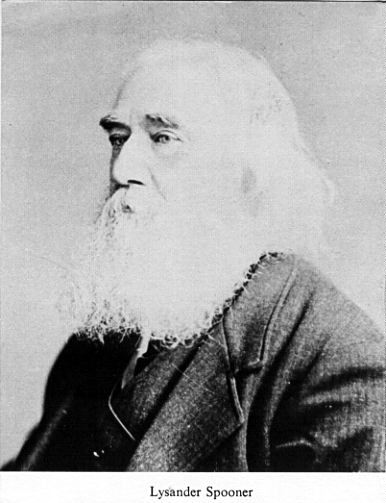Liberty Matters
Thesis and Nomos
 Roderick Long concludes his essay by saying, “I’d also be interested in discussing the relation between Spooner’s and Hayek’s theories of law.” Let’s do that. Here’s Barnett on Spooner again:
Roderick Long concludes his essay by saying, “I’d also be interested in discussing the relation between Spooner’s and Hayek’s theories of law.” Let’s do that. Here’s Barnett on Spooner again:“If legislation be consistent with natural justice, and the natural or intrinsic obligation of the contract of government, it is obligatory: if not, not.” [Spooner, The Unconstitutionality of Slavery, 8] For Spooner, then, the choice was a conception of law that was consistent with natural justice, which would then carry with it a duty of obedience, or a conception of law based solely on the successful imposition of power, which there would be no moral duty to obey.
Spooner also notes that “only laws that are consistent with the natural and inalienable rights of the people can justly claim a duty of obedience.” Spooner, then, is aware that there are things we call laws, but which really have no basis other than someone’s use of coercion to compel obedience, and other things, sometimes called laws, which are consistent with natural justice.
This distinction calls to mind Hayek’s distinction between thesis and nomos.[71] In Law, Legislation, and Liberty, Hayek uses thesis for rules imposed by the sovereign, a top-down process involving coercion; and nomos for rules that emerge in a bottom-up, evolutionary process. While Hayek didn’t claim to be working in the natural-law tradition, the parallels are interesting: nomos doesn’t involve coercion and is most consistent with respect for liberty. It reflects the evolving results of people’s attempts to coordinate their actions and live together in peace and prosperity. It is not imposed from above by threat of violence but instead reflects common practice and sensibility.
This seems to be very friendly to Spooner’s conception of natural justice: while Hayek and Spooner seem to oppose coercion for different reasons, they both end up with the idea that coercion is detrimental to human well-being and therefore not a proper basis for the social order. Hayek eschews the language of “natural and inalienable rights” but nevertheless praises liberty and offers us good reasons to disapprove of coercive rules imposed by force. It’s not obvious that the spontaneous order evolves teleologically “towards” natural law, but it’s certainly possible, and in any case a society based on Hayekian nomos seems like it would satisfy Spooner’s conditions for legitimate authority.
Roderick suggested that the two theories would benefit from each other; perhaps this is one dimension of that. Perhaps the Hayekian nomos needs some idea of a teleology of human good, of which Spoonerian natural law is an example; and perhaps Spooner’s constitutionalism would be sharper with an understanding of the thesis/nomos distinction mixed in.
Endnotes
[71.] F.A. Hayek, Law, Legislation and Liberty: A New Statement of the Liberal Principles of Justice and Political Economy. Volume I: Rules and Order (The University of Chicago Press, 1973). Chapter 5: “Nomos: The Law of liberty” and Chapter 6: “Thesis: The Law of Legislation”.
Copyright and Fair Use Statement
“Liberty Matters” is the copyright of Liberty Fund, Inc. This material is put on line to further the educational goals of Liberty Fund, Inc. These essays and responses may be quoted and otherwise used under “fair use” provisions for educational and academic purposes. To reprint these essays in course booklets requires the prior permission of Liberty Fund, Inc. Please contact oll@libertyfund.org if you have any questions.